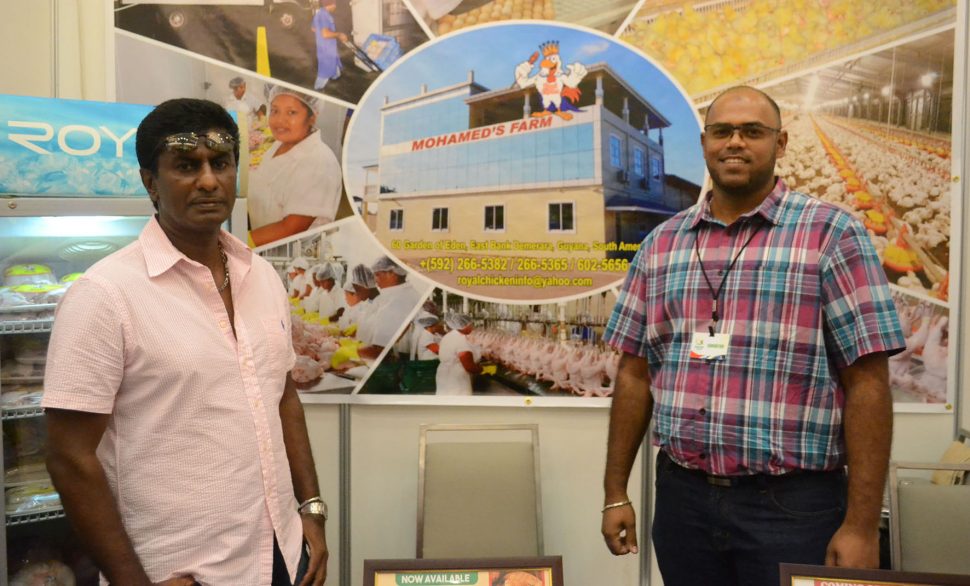If you mention the brand Royal Chicken in a conversation about the local poultry industry you will probably not get the kind of knee jerk response that some other brands elicit. And yet the product of Mohammed’s Farm, a twenty-four–year-old family business headquartered at 60 Garden of Eden, East Bank Demerara is one of the leading players in the country’s poultry sector; and if its plans for growth and expansion are what the company’s General Manager Rasheed Baksh say they are then sooner rather than later this fast-emerging giant is bound to become a household name among consumers..
You wouldn’t have thought that a multi-million dollar poultry establishment that slaughters between 50,000 and 60,000 birds per week, delivers chicken parts across the coastal regions of Guyana in six refrigerated trucks, extends its delivery service as far as Lethem was built from ground up by Shameer Mohammed, still in his forties, would have such a low profile.
You probably wouldn’t have thought, either, that Mohamed’s Farm has its origin in an operation comprising fifty birds, a small freezer and a modest distribution involving small shops in the immediate neighbourhood. By 2012 the firm had done well enough to acquire a poultry plucking and processing plant and the following year, a Hatchery. That was the same year in which the Royal Chicken brand was launched after which customers as far as Charity, Molsen Creek and Linden began to benefit from chicken supplies free of delivery costs.
These days, Mohamed’s Farm and its more than 200 employees have spread themselves over two locations. Its operations at Yarrowkabra on the Soesdyke/Linden Highway are dedicated to the rearing of chickens whilst the Garden of Eden base houses the hatchery and processing plant.
In September, Mohammed’s Farm turned up at the Guyana Trade and Investment Exhibition (GuyTIE) aiming, seemingly, to up its marketing appeal at a time when the possibilities of further increasing its market share are probably as good as they have ever been. Baksh, an Accountant who is presently pursuing an MBA, admits that setting aside the opportunities afforded for the expansion of local market share the brand is eyeing the prospects of securing markets outside of Guyana as well as benefitting from the Local Content opportunity associated with the country’s emerging oil and gas industry.
A leaflet circulated by Mohammed’s Farm at the GuyTIE event attributes its success to what it says is the “bond of trust and reliability” created with customers. That, however, is only part of the story. The evidence on the ground suggests that much of the key to what the company has become is attributable to significant incremental investments in adding value to the establishment by continually modernizing its operations.
In January 2013 Mohammed made his most significant investment in the establishment so far, creating a new processing plant equipped with what the company says was “the most advanced tools and equipment for poultry processing.” March 2014 saw another major investment by the company, this time in a modern hatchery.
Not unmindful, Baksh says, of the critical importance of ‘health and wellness’ as a priority operational concern, Mohammed has invested in the recruitment of specialist veterinarian support from both within and outside the region. Aiming for ISO certification as one of its next major targets the company has subjected its operations to regular inspection by the Guyana Livestock Development Authority. (GLDA).
Seemingly on its way to becoming a well-integrated operation Mohamed’s Farm has set its sights on the establishment of its own feed-production operation which Baksh says will serve to further enhance the reliability of the overall operation.
Keen to meet the particular demands of what, these days, is a widely varied chicken market, Royal Chicken, whole chicken aside, offers up to fourteen different cuts including quartered chicken, heavily demanded in the popular barbecue sector, breasts (with or without bone) as well as what one might call routinely consumed chicken parts, including drumsticks, thighs, liver and gizzard and feet. Additionally, Royal Chicken’s Jumbo Packs appear ideal for dinner parties and family feed-ups. Mindful too, of the varied nature of its market, Royal Chicken offers chicken particularly prepared to Halal requirements.
Like most businesses in many of the country’s key economic sectors, Royal Chicken’s operations are constantly vulnerable to the vagaries of what, over the years, has been a dangerously unreliable electricity supply system; so that while the company utilizes power from the national grid it has understandably installed its own electricity generating system to protect its chickens which, alive or slaughtered, are vulnerable to even relatively short spells of power outage.
Mindful, Baksh says, to place a mark of modernity on its operations, Mohamed Farm’s next major project is a multi -million dollar investment in the conversion of the company’s operations from the conventional open house confinement to the contemporary Tunnel House penning. The plan is to create fifty such facilities each with a capacity to accommodate 40,000 birds. The company has already created two Tunnel Houses and are, even now, in the process of creating a further two as it moves in the direction of full conversion.






